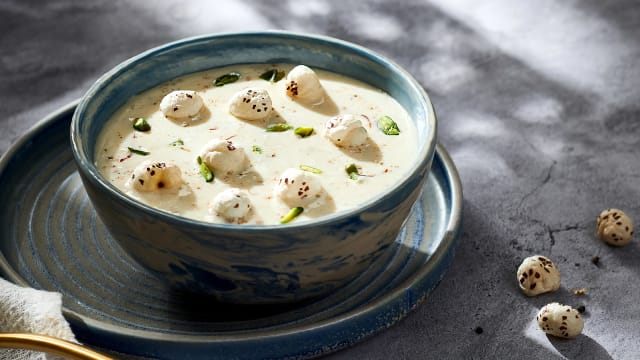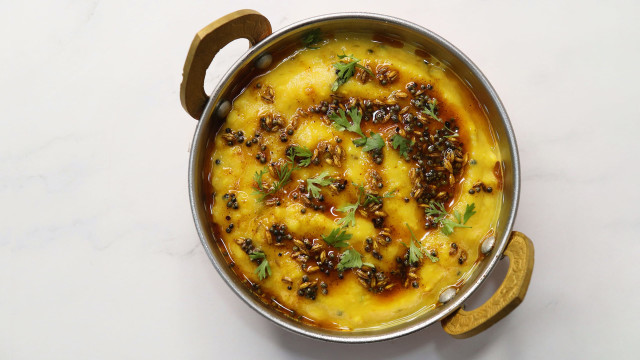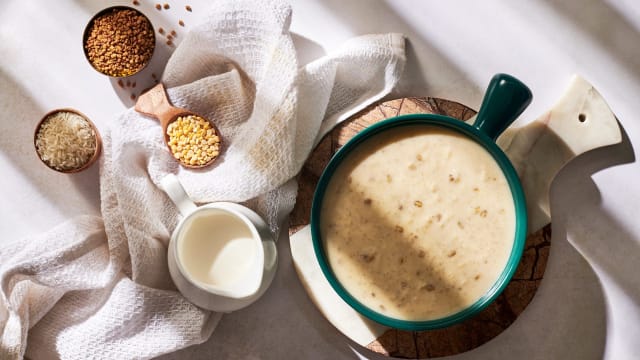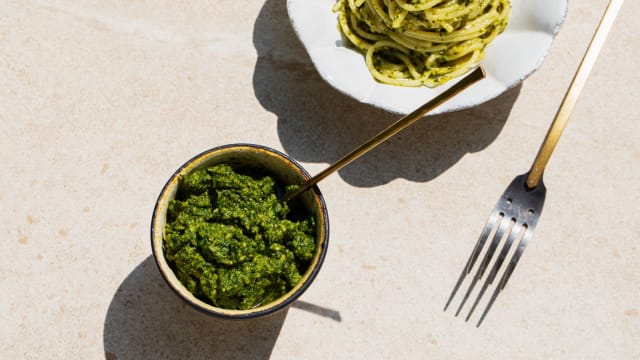The Healing Power of Panjiri
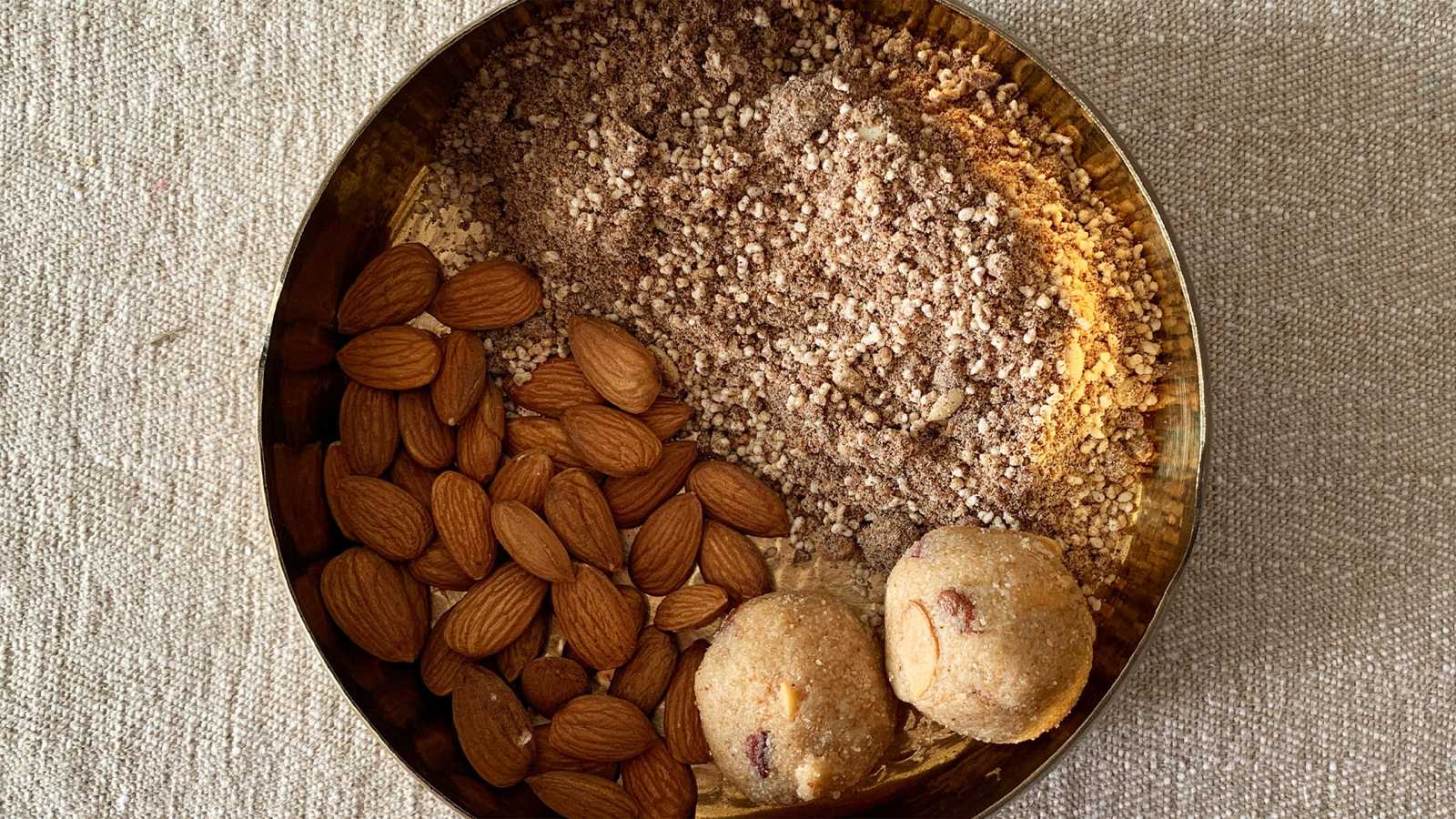
I am known to imagine the worst things possible, but this was not a scenario that had ever played out in my head. Yes, I had been afraid of losing the baby very early in my first pregnancy. Having to terminate it in the fifth month was not something I had thought possible. But it was true. I was going to have to let go of my unborn child for medical reasons.
Was I broken by the news? I don’t remember. All I recall is the urgency to get done with the procedure. When I returned from the hospital, after a medically induced labor that had lasted 48 agonizing hours, I was broken, both physically and emotionally. There was no reward for the pain I had endured, and nothing to look forward to. I felt inept and incomplete.
Traditions of Food and Care
The first few days were a blur. The blood, the pain, the soreness made it impossible for me to register anything else. Thankfully I was with my mother, who brought me to her home straight from the hospital. My aunts came over too: they wanted to ensure that their favorite niece was taken care of in the best way possible, which in my family translates to only one thing — being well fed.
I vaguely remember my chachi making posto halwa, a rich, energy-dense concoction of poppy seeds, nuts, dried fruit, and loads of ghee that takes hours of intense labor to make. It is traditionally given to new mothers in many parts of North India to promote lactation and heal quickly. I couldn’t swallow even a spoonful. I did not feel like a mother.
It was my bua’s turn next. She brought dense, ghee-laden laddus, spiked with saunth (ginger powder), almonds, and foxnuts. She said they would give me strength. All my life I had loved her laddus, but I couldn’t stand them now. It must have been hard for my aunts and mother to see their 25-year-old daughter endure the greatest pain there is. They never let it show. They would pretend to be cheerful and, one after the other, bring me my favorite foods to eat. One after the other, I rejected them all. Until a week or so later, when my mother made panjiri.
I don’t recall how I found myself in front of a big bowl of panjiri — I know only that it was the first thing I could taste since the termination procedure. It was sweet and nutty, with its characteristic saundhapan, a distinct smell imparted by hours of dry roasting. Most of all, it was gratifying.
A Food Infused with Love
Made across North India, generally as a ritual offering on festive and auspicious occasions for Hindus, panjiri is a dry mix of wheat flour, ghee, powdered sugar, edible gum, dry fruits, foxnuts, and — the main ingredient of every panjiri — love. Generally, this love is directed towards the deity it is being offered to. In my case, it was a mother’s love for her grieving daughter.
I had always been fond of panjiri. As a child, I ate too much of it, especially after the annual Satyanarayan Katha prayer ritual at home, where it was the main offering. On Janmashtami, Lord Krishna’s birthday, which usually coincides with mine, I would ask mother to make a little extra as a birthday treat, and would snack on it for weeks afterwards. When invited to a neighbor’s home for a puja or katha (prayer recitation), I would bring back an extra portion of prasad: panjiri topped with sliced banana, diced apple, and often a small barfi. I hated the embellishments but loved the panjiri.
In many Indian homes, panjiri is also made on another auspicious occasion: the birth of a child. Naturally fortifying, filled with the goodness of home-made ghee and top quality nuts, roasted painstakingly for hours by the family’s older women, it was considered a healing food that helped the new mother regain emotional and physical strength. The ghee in the panjiri helped lubricate her joints, which had suffered nine months of pregnancy; the nuts generated heat, preventing her fragile body from catching a cold; and the atta — whole wheat flour — that held everything together provided energy and vigor. As my grandmother would say, if pregnancy and labor broke a woman’s body, panjiri helped heal it back.
My body was broken, but so was my heart. Panjiri helped me put both back together.
They say when you are angry, sad, or depressed you tend to turn to food for emotional support. I was all of those things at once. I was also hungry all the time, and nothing but panjiri would satisfy me. I had it after breakfast, before lunch, with tea, after dinner, and late at night when sleep evaded me. I carried the jar from room to room, kept it on my bed, and held it close to my heart when watching TV. The jar of panjiri had become my crutch, helping me stand straight after falling hard.
The Science of Healing
Looking back, there was science at play in my addiction. Energy-dense panjiri made with healthy fats is nutritionally a brilliant food. The omega-3 that comes from copious amount of ghee has calming and anti-depressant properties; the generous proportion of nuts provide the body with vitamins and minerals to combat insomnia, irritability, anxiety, and brain fog. The foxnut, my favorite part of panjiri, contains magnesium that reduces pain, helping soothe the aches that wrack a new mother’s body. Gond, an edible gum, is calcium-rich for stronger bones, and is believed to boost stamina. Meanwhile, the familiarity of taste, the aroma of it being made, and the nostalgia attached to panjiri promoted my emotional wellbeing.
After weeks of love and care by my mother, aunts, and family, I was finally well enough to go to my own home. I had initially been afraid to return to the empty house, which, just a few weeks earlier, was teeming with the excitement of welcoming a new member. But I also wanted to move ahead and take what life had to give me. To help me do that, I had a few jars of my mother’s panjiri in my bag.
PRACTICE is an ongoing series of columns about home cooking as an expression of wellbeing.
RECIPE | Panjiri
The Benefits
- Reduce postpartum pain
- Rebuild stamina and mental clarity
- Soothe, calm, and uplift mood

